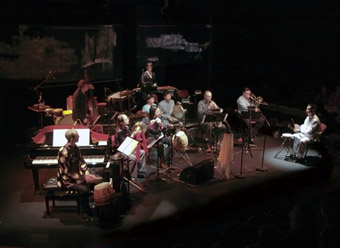 |
Clocked Out, The Wide Alley photo Sharka Bosakova |
If the audience is familiar with both cultures, fine, but that's unlikely in the case of Clocked Out's interweaving of the idiosyncratic traditional music of the oldest neighbourhood of Chengdu in China's Sichuan province and the ensemble's Western jazz and avant-garde roots. Doubtless there were Chinese members of the substantial audience in the Sydney Opera House's The Studio for the concert who were conversant with all the idioms on offer; for the rest of us, it was a great adventure—the beginnings of an inner re-tuning. And we can further that new listening when Clocked Out release the CD of The Wide Alley they recorded shortly after the Sydney concert.
Clocked Out's approach displays a meeting of forms across cultures and musical languages but also allows the musics of Sichuan enough time-space to stand on their own: in the presentation of traditional works, in re-framings of native classics and in wilder experimental fusions where traditional instrumentalists reveal how they can transplant their virtuosity to new terrains.
The sources for Clocked Out's The Wide Alley are a mix of music of Sichaun opera percussion and street and folksong with which the company's directors, Vanessa Tomlinson and Erik Griswold, have become familiar through visits to the region across a decade. They acknowledge particular inspiration gained from composer and national living treasure Zou Xiangping.
What follows is my humble attempt at recollection of some of the works from an engrossing concert. In Griswold's lyrical and then bracing opener, "Da Dao Wu Wei" (Don’t just do something, stand there!), the flute (Shi Lei) dances little riffing runs with cymbals across electric bass (Robert Davidson) and a jazzy trombone (Adrian Sherriff) that slides growling to the depths and then soars, singing surprisingly high. After the stirring flights of flute and trombone, "Zhai Hai Tang" (Picking Begonia Flowers) introduces us to another remarkable instrument, the voice of Tian Linping. Griswold describes the distinctive local style as "a mix of high art with flutter tongue." The effect is of a lilting, gargling trillgargling complete with astonishing glissandi in a composition replete with passages where flute and erhu (Zhou Yu) intricately entwine. The overall effect, aided by the singer's smiling demeanour, is oddly reminiscent of the charm of Western light opera.
Impressionistic images of cyclists float on screens above the stage, pedalling serenely to Vanessa Tomlinson's "Bicycle Groove/Moon Music/Beatrice", in synch with Griswold's typically dense but easeful pianism, some moody trumpet and the composer on drum kit driving the clockwork pulse.
In "Huangsi Pagoda", the first of Two Poems of Du Fu, Tian Linping subtly engages with composer Griswold's spare piano accompaniment, hovering between art song and jazz. Fragments of the lyrics such as "...tired and need the breeze..." are projected: The second poem, "Shu Lai" (Happy Meeting), is a traditional bamboo flute solo from Shi Lei with virtuosic glides that sound like a strange bird strikingly interrupting the dominant melody in a totally different key before the work resolves into a galloping jig.
Vanessa Tomlinson's "Cotton Man" walks to the spare beat of a twanging bass to which hard-edged Chinese percussion, calls from the ensemble and replies from the trombone build complexity and volume until the whole ensemble has created a resonating epic of working life.
On the screen people dance slowly in western ballroom embraces; the erhu sings like a human voice; Griswold's plucked piano and Tomlinson's xylophone ratchet sweetly like a music box. Here, in "Er Quan Ying Yue" (Moonlight over Hui Spring), there are moments of delightful suspension. In another traditional melody, "A Bing Gan Hua Hui" (Enjoying the markets), Tian Linping's voice and Zhou Yu's erhu dance together and the entire orchestra soon becomes one, a unison celebration of spices, flowers, noodles...
Griswold describes "Chuanju Overture" (traditional, arranged by Zhong Kaizhi and Zou Xiangping) as a collage of all the styles of the region, including Sichuan opera. Built around gong and cymbals the work engenders rich textures from seemingly limited means, adding timber percussion, then skins, erhu and flute, long bass notes, a call and reply passage, and an epic march to the end. The beat is catchy but elusive; as Griswold declares, "the rhythms are unbelievably complex." The orchestra is watchfully led, in traditional manner, by percussionist Zou Xianping.
Griswold's version of the traditional tune "Di Da Kwa" (12 month story) celebrates the calendar and the influence of Clocked Out's inspiration, Zou Xiangping. Each section of the work is given to a month and a corresponding activity: in January, play with dragon kites; in April, plant seeds; in June, start to use fans...The year unfolds, the pulse quickens, the sense of celebration endlessly escalating in glorious orchestral communalism.
For those of us familiar with the Australian Arts Orchestra's dynamic partnerings with Indonesian, Indian and Australian Aboriginal musicians over many years, Clocked Out's engagement with the musicians of Sichuan proved to be another heartening example of the great potential of such long-term, considered cross-cultural collabrations. The specifity of this collaboration—the focus on aspects of the Chengdu heritage—is particularly significant, the partnership giving longer life to threatened traditional forms. And the music sounds so very good, strangely familiar by the end of the concert as very different musical languages find common ground through the capacity of avant garde music and jazz to accommodate rhythmic complexities and alien modalities, and as traditional musicians willingly engage with the new.
Clocked Out, The Wide Alley, co-directors Erik Griswold (piano) and Vanessa Tomlinson (percussion), Robert Davidson (double bass),?Peter Knight (trumpet), Adrian Sherriff (trombone), Shi Lei (bamboo flutes), Tian Linping (voice), ?Zhong Kaizhi (percussion),?Zhou Yu (erhu),?Zou Xiangping (voice/percussion), design Sharka Bosakova, Utzon Music Series, curator Marshall Maguire, The Studio, Sydney Opera House, March 1, www.clockedout.org
RealTime issue #90 April-May 2009 pg. web
© Keith Gallasch; for permission to reproduce apply to [email protected]








 back
back